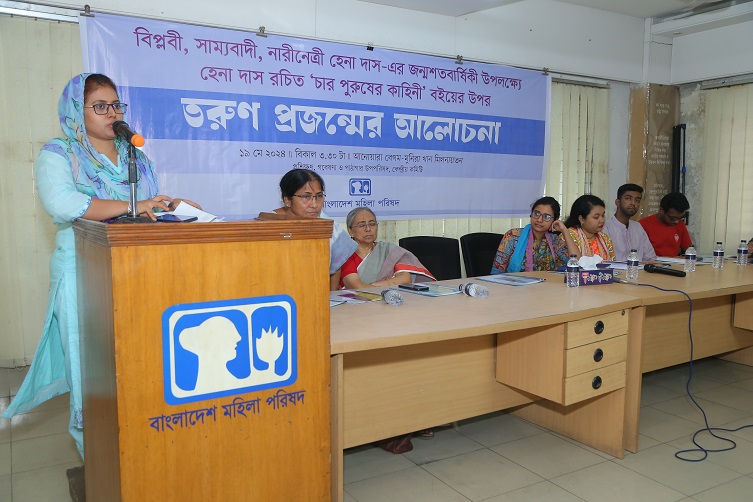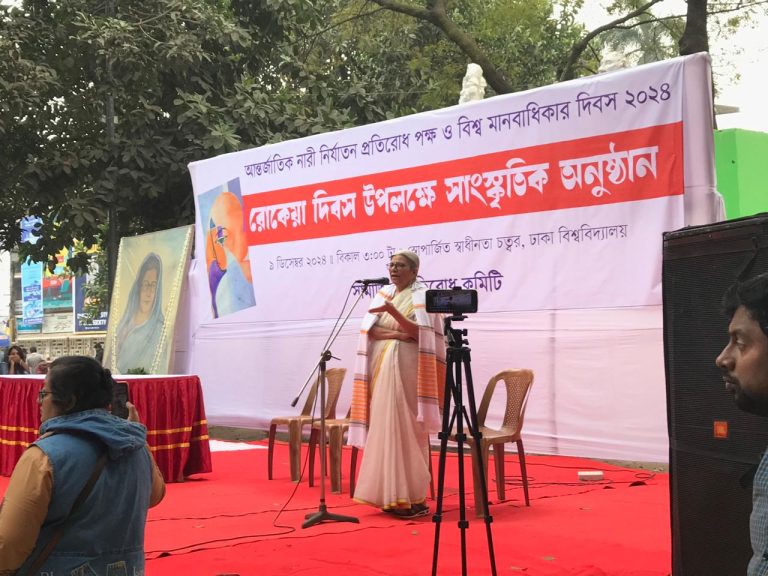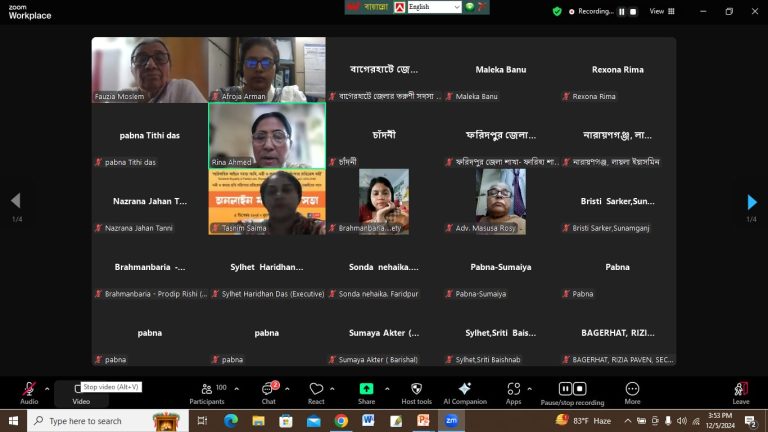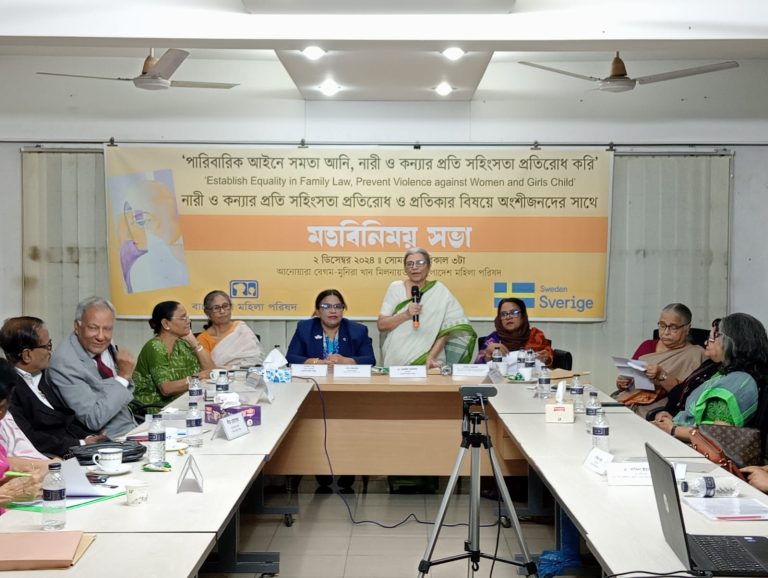On May 19, 2024, at 3:30 PM, Bangladesh Mahila Parishad organized a discussion session on the essay “Char Purusher Kahini” by the organization’s late president, Hena Das. The event, held at the Anwara Begum and Munira Khan Auditorium, was part of a year-long series of programs commemorating Hena Das’s birth centenary. Dr. Fauzia Moslem, President of the Central Committee of Bangladesh Mahila Parishad, presided over the session, while Rina Ahmed, Secretary of Training, Research, and Library, delivered the welcome address.

The discussion featured contributions from various notable individuals, including Mahmud Khalid, a student of Criminology at Dhaka University; Samira Rahman, a student of Peace and Conflict Studies; Farab Al Rahman Bhuiya, a student of Women and Gender Studies; Archi Haque, a staff reporter at Ajker Patrika; and Halima Tus Sadia, a member of the Research and Library Sub-committee of Bangladesh Mahila Parishad. Their participation highlighted the diverse perspectives and interdisciplinary insights into Hena Das’s work and its relevance today.
Speakers at the event praised Hena Das as a progressive, superstition-free, secular, tolerant, and renaissance-believing individual. They highlighted how she worked under the ideals of communism to transform the lives of women in the subcontinent during a time when free and independent environments for women were scarce. In such a challenging environment, Hena Das dedicated herself to understanding and improving the lives of various marginalized communities. Her writings vividly depicted the political, social, and cultural aspects of her time, emphasizing societal over individual life and advocating for women’s rights and equality. Hena Das’s work was portrayed as a beacon of hope and a model of commitment. She selflessly immersed herself in understanding and improving the lives of the disadvantaged, engaging directly with various communities to grasp their life patterns and striving for their betterment. Her essay “Char Purusher Kahini” is particularly significant as it encapsulates the social, familial, and political transformations of the 19th-century Indian subcontinent. Her portrayal of these changes is both vivid and insightful, offering a clear window into the era’s socio-political landscape. The speakers noted that Hena Das’s commitment to secularism, tolerance, and social reform continues to be relevant. They emphasized that her writings and activism reflect a dedication to nationalistic ideals, prioritizing social life over personal gain. She fervently called for a unified platform for women’s movements, advocating for equality and urging her contemporaries to learn from the best of their generation to enhance their perspectives. Her work is seen as an essential resource for understanding the struggle for women’s rights and social equality in a historical context, providing inspiration and guidance for current and future generations.

Dr. Fauzia Moslem, in her presidential speech, stressed the importance of evaluating Hena Das’s legacy in the present context. She highlighted the necessity of guiding the youth toward proper thinking to continue Das’s fight against all forms of discrimination. Dr. Moslem emphasized that achieving true equality requires a long journey and underscored the importance of preparing oneself to protect humanity from within one’s circumstances. She remarked that Hena Das’s movement aimed to liberate people from all forms of inequality, and understanding the youth’s thoughts and directing them toward this goal is crucial. Dr. Moslem pointed out that Hena Das’s life and work offer valuable lessons for the younger generation. Her struggle and dedication to social reform demonstrate the importance of resilience, empathy, and a deep commitment to justice. Das’s writings call for a careful analysis of contemporary issues in light of past struggles, urging today’s youth to adopt a thoughtful and proactive stance in addressing social inequalities.
Rina Ahmed, in her welcome address, emphasized the role of Bangladesh Mahila Parishad as a volunteer women’s organization that has been working for 54 years. She elaborated on the organization’s year-long programs planned for Hena Das’s birth centenary, aiming to understand the young generation’s perspective on her work “Char Purusher Kahini.” Ahmed highlighted Hena Das’s dedication to the common people, noting how she consistently prioritized their well-being over personal comfort and luxury. Her approach was marked by patience, wisdom, and an unwavering commitment to justice. The discussion session underscored the significance of Hena Das’s essay in portraying the family, social, and political landscape of the 19th-century Indian subcontinent. Her depiction of harmony and communal integration during that era provides a stark contrast to contemporary societal fragmentation. The speakers emphasized that the current social context appears to have regressed in terms of communal harmony, making Hena Das’s vision of a just and equitable society even more relevant. They argued that in times of crisis, Hena Das’s commitment to building a communist society and her proactive life serve as a source of inspiration for today’s youth. Her ideals of fairness, equality, and social justice remain crucial in addressing modern societal challenges. The speakers collectively agreed that continuing Hena Das’s movement requires understanding and guiding the youth’s thoughts toward building a society free from discrimination and inequality.

The session was attended by central and Dhaka metropolitan committee leaders of Bangladesh Mahila Parishad, editorial members, journalists, and officials. Afroja Arman, the training and research officer, moderated the session, ensuring a smooth and engaging discussion. Overall, the event highlighted the enduring legacy of Hena Das and her contributions to social reform and women’s rights. Her work continues to inspire and guide efforts toward creating a more just and equitable society.




